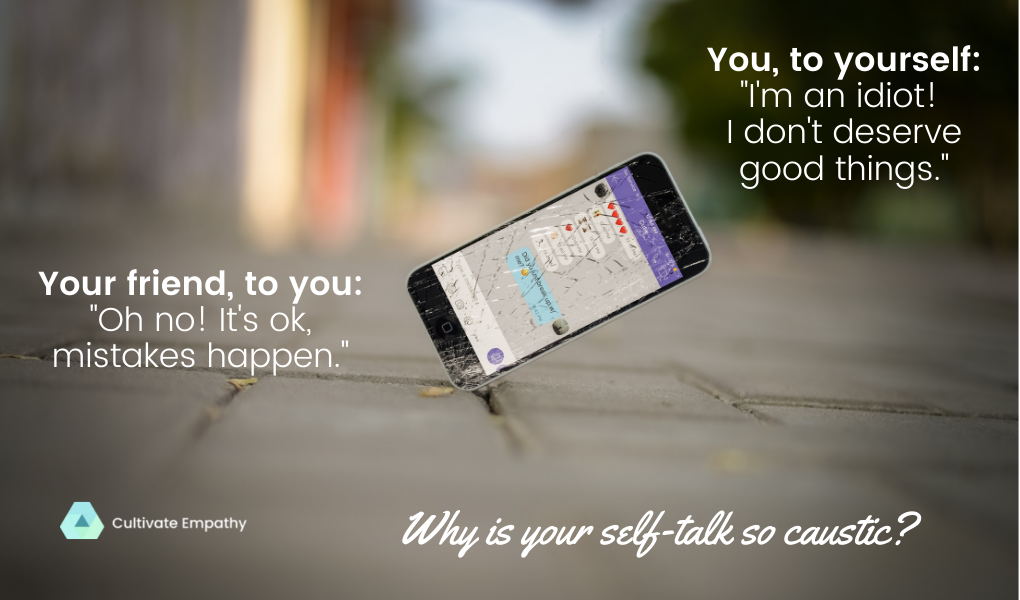When you’re in the middle of a barrage of self-shaming, your inner monologue dripping with contempt and seething with discontent, do you ever stop and ask, “Why do I do this to myself?!”
Would you ever talk to someone you care about like this? So why are you doing it to yourself?

Hey, perfectionist! I see you.
Despite years of therapy, cognitive-behavioral training, and my passion for studying and practicing EQ skills, my own inner monologue is a seemingly bottomless wellspring of shaming and should-ing.
I imagine this voice as an overly dramatic 8-year-old: her hair is frazzled, she’s hungry, she’s exhausted, she’s helpless, and she needs someone to blame for all her ills.
She pops up at the least helpful times – when I’m trying to fall asleep, preparing for an important meeting, or trying to recover from a mistake.
“You should have stood up to that person. You’re so weak.”
“What will people think of you?”
“You’re going to fail.”
“That was so bad! Maybe you should give up.”
She isn’t swayed by positive affirmations or counterarguments. She doesn’t want to be stopped.

In fact, according to psychologists, the whole reason for her existence is to help me learn from my mistakes. More specifically, our inner critic’s messages are the ones we interpreted from our parents and other trusted adults as they tried to help us grow up.
Sometimes these messages came from adults verbatim, others are what we made their words mean.
On our worst days, it’s impossible to receive feedback as anything other than criticism. Our inner critic is, simply, you on your worst day after receiving feedback. That criticism is playing on a perpetual loop.
Behind the criticism is a lesson unlearned. Your inner critic doesn’t have the nuanced language to help you understand the lesson, so it keeps repeating the same shameful thing, expecting you to figure it out.

Managing Your Inner Critic
When you are having a bad day, how do you pause, recover, and recharge?
Use the same techniques to manage the perpetual tantrum that is your inner critic.
What works best for me: hugs and empathy from a friend. When I need a quick hit or am unable to see a friend, I’ve found that putting my own hand over my heart and practicing self-compassion is what works best to calm myself.
“I hate that I didn’t do as well as I am capable, too! Thank you for trying to teach me. I hear you – I should have spent more time preparing and that would have helped.”
Self-compassion allows me to acknowledge the inner critic’s intentions instead of focusing on the words: she wants me to do better, to be safer.
Arguing with her doesn’t get her to stop, but appreciating her does.
Speaking to yourself in the third person is a way to put distance between you and your inner critic. (Hopefully, you understood that in advance, but I promise I don’t have DID!) Sometimes I need to have a conversation with myself, either in the mirror or in my journal. Don’t judge yourself, heal yourself.
Self-Awareness Exercise to Manage Your Inner Critic
- Give the inner critic a name and/or face; give yourself distance from the voice.
- What is the lesson your inner critic wants you to learn?
- How is this related to a childhood experience or pattern?
- Imagine the inner critic as a scared person in need of care and compassion. Do whatever you can to reassure them.
It is hard to be human. Always remember that you are worthy of love!